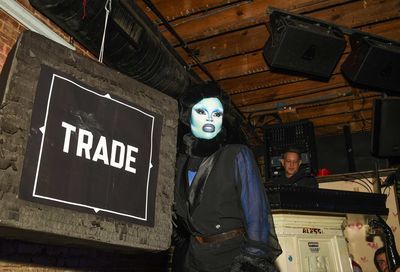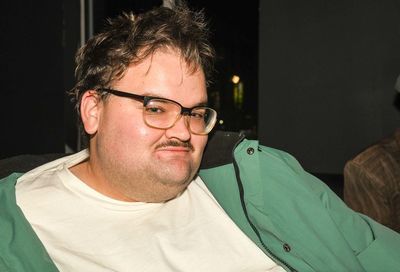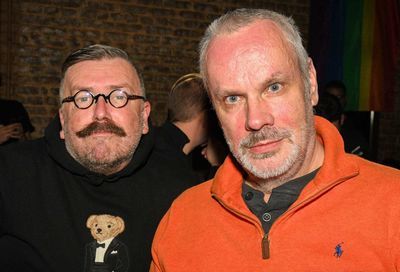OutWrite 2019: ‘Nirvana Is Here’ by Aaron Hamburger

The book’s protagonist is a Medieval historian named Ari Silverman. Nirvana Is Here begins in Ari’s present. An openly gay professor, he’s about to meet a high school classmate, Justin, whom he hasn’t seen in 20 years. The prospect sets off bittersweet memories of the early 1990s, when a teenaged Ari — white, Jewish, suburban, and recovering from the attack — met Justin, a black scholarship student from Detroit. This excerpt takes place after Ari was assaulted by a classmate at a Jewish school. His parents have transferred him to a private secular school and are also taking him to karate lessons so he’ll learn to defend himself. It begins on his first day at this new school.
It was my first morning at the Dalton Preparatory School of Metropolitan Detroit.
Outfitted in my own tight, new uniform, I entered the front doors alone, my feet damp inside slippery dress shoes. No one returned my anxious smile.
Dean Demuth stood beside a glass trophy case filled with news clippings trumpeting Dalton’s success on courts, ski slopes, and ice rinks. I greeted him with a hearty, “Good morning, sir!”
“Your tie,” he replied.
I looked down. My polyester tie had slipped a half-inch from my collar. I yanked it back up, so it choked my neck.
Between classes, I wandered the halls, getting lost while looking for the Commons Room, The Quad, The Chapel, and the ominous-sounding Dixon House. When I sought out help, I stammered like an idiot.
“Are you an exchange student?” one girl asked me.
At lunchtime, we filed into the Dining Hall, where all meals were eaten with a fork and knife, even burgers and tacos. Today for lunch, we were served decidedly non-kosher cheeseburgers.
I’d never tasted a cheeseburger, but I’d always been curious about them. At first, I considered peeling the melted cheese off my meat. Finally, I just bit into it. It was delicious, the gooey cheese melting over the seared brown patty, and the juices running into the bun. I finished it in a minute.
Why would God make something so wonderful and forbid us to eat it?
***
In art class, we could take off our jackets and cover our shirts and ties with pale blue smocks. After outfitting myself in a smock, I chose a piece of good paper and sat at one of the tables to draw. Our teacher, Ms. Hunter, had brought in her old stereo to inspire us, and one of the boys put on an Ice-T tape. Another boy said, “Hey, faggot, turn off that rap crap.”
“Who you calling faggot, faggot?”
“You, faggot.”
I fixed my eyes on my drawing. My pen had torn a small hole in the paper.
“Hey, hey, hey…” Ms. Hunter scooted over, stopped the stereo. “Watch the language, guys. And no more music for today.”
“Aw, come on, please…” both boys begged, almost in chorus.
“Alright, but don’t let me catch you talking that way again.”
Ms. Hunter, the only female teacher in school who wore pants, gave little instruction beyond how to work the projector, so we could trace images directly onto paper or canvas. “No one draws freehand anymore,” she said, winding her long hair into a bun that inevitably came loose. “You think Andy Warhol drew freehand?”
Despite Andy Warhol, I stuck to the old-fashioned way, drawing a multi-panel cartoon of Dean Demuth choking several students lining up for uniform check. “Cool beans,” said Ms. Hunter, peering over my shoulder.
Cool beans? I thought. Was that something people said?
“Your faces are good,” she added. “But the bodies are out of proportion. You might want to spend some time looking at yourself naked.”
***
In French, Justin Jackson sat on the edge of my desk. “What’s your name?”
I’d had my eye on Justin for a while, though he hadn’t paid much attention my way. I overheard him laughing with his friends, “Everyone thinks I’m on scholarship for basketball.” In fact, he played tennis, and his scholarship was academic, not athletic. He’d won some kind of trophy in math. Socially, he wasn’t a jock or a nerd, but belonged to another, mysterious crowd of ironic, smirking kids whose circle I couldn’t place because it hadn’t existed at my old school.
“What kind of name’s Ari?” he asked. “Is it French? Is that why you’re so good at French?”
I loved speaking French. It made me feel more sophisticated, all-knowing, confident, and less Jewish. Also, in French class I didn’t have to invent interesting things to say to people. The dialogue was already printed for me to memorize.
“No, it’s Hebrew for lion,” I explained.
Justin stared at me. “Lion, huh? You seem more like a dove. I’ll just call you Brain. Did you do that workbook assignment last night? Can I take a look?”
I took this as a command. “Okay.”
While copying my answers, Justin asked why I’d transferred to Dalton. I recited my standard excuse: My parents felt my old school didn’t offer enough “enrichment.”
“I love the suburbs. The land of enrichment.” He resumed copying my work in swift lacy writing, with the bored efficiency of a British lord signing a check. “Thanks, Brain,” Justin said in his slow, careful baritone, handing me back my workbook when he was done. He got up to sit with another black kid in the back of the room. “You’re cool.”
I was so startled to hear it that I almost dropped the workbook on the floor.
Was I really? Why did he think so? I wanted to know more.
***
“Who died?”
Not understanding the question, I looked up blankly at Justin from my seat on the bench by the school entrance.
“Why do you look so down in the mouth?” he asked.
I said I was waiting for my mother to take me to karate, and then, maybe because I’d suppressed the thought for so long, I admitted, “I hate it.”
“Then don’t go.”
“But my mom is coming to take me.”
Justin winked. “Follow me,” he said.
Flattered by the invitation, I went with him to the art room, shut up for the evening. Justin calmly unlocked the door. How did he have the key? “Ms. Hunter likes football players. My buddy Marlin made us all copies.”
Inside, we sat with the lights out, swiveling on the metal stools and staring at the paint-speckled floor, like a Jackson Pollock painting. “Just hide out here until your karate class is over,” said Justin.
“Don’t you have to be somewhere?” I asked, but I didn’t want him to go.
“It can wait.” He had a lean, hungry look that I liked. I felt uncomfortable on my hard stool, but I didn’t dare move, or do anything to disturb the moment.
“Want to listen to something?” He pulled a tape out of his briefcase. The tape was marked on the front: MIX. “This is Nirvana.”
The band’s name, Nirvana, made me think the music would be soothing, New Agey, like Enya. But the song began with a guitar snarl, followed by a fury of driving drumbeats and metal. I didn’t usually like loud metal music — it sounded too much like violence — but this song didn’t qualify exactly as heavy metal, with all the sounds fitting together in a pattern. It was more like separate noises, each with its own direction, like the paint splatters on the art room floor.
Just as I got used to it, the noisy part died down, and Kurt Cobain began to sing.
What first caught my attention was the ache in his voice. He’d mumble an unintelligible line or two, then fling out the next few words in a trembling, cracked yelp edged with a nervous resentment, drawing out words with a strange sarcasm. He held a sarcastic yowl for strained seconds that felt like ages, giving them an eerie emphasis. His voice sounded both tired and anxious, as if he’d been ignored all his life and was sick of it. Why would no one listen?
Justin drummed his silver pen against one of the tables to the beat. I wanted to tell him to stop so I could hear everything. I didn’t want to miss a note.
When Justin shut off the tape, I was perched on the edge of my chair, my brain tingling. I’d never heard a pop song like this, complex like a work of art, with a deep emotional pull like a novel or a movie. By comparison, everything else on the radio sounded candy-coated and fake.
Justin was staring, waiting for me to speak. He must have felt as I did about the song, and I wanted desperately to say something meaningful, important.
“Uh, are they British?” I asked.
“No, they’re American. But not commercial.” He said the word “commercial” with a pained look.
All I could think of was, “Neat.”
“Neat?” he said.
My stomach sank. I’d messed this up. “Why? Was that wrong?”
“No. You never get anything wrong. You’re an intelligent young man.” He ejected the tape from the stereo.
“Wait,” I said. “What did I do?”
“That’s all I got. I didn’t bring any Julie Andrews for you,” he said, and left.
I sat alone and replayed the conversation. What else could I have said? Cool. Cool beans? No, just cool. Or I could have said nice, good, great — anything but neat.
Maybe I could run after him, or find him tomorrow and say I’d been taking some medication that had messed with my head. “Neat,” I’d say. “Can you believe I said that?” And then we’d laugh together about it. Yes, that might work.
Nirvana Is Here, first published in May 2019, is available online at Politics and Prose and Amazon. For more information on Aaron Hamburger, visit www.aaronhamburger.com.
Support Metro Weekly’s Journalism
These are challenging times for news organizations. And yet it’s crucial we stay active and provide vital resources and information to both our local readers and the world. So won’t you please take a moment and consider supporting Metro Weekly with a membership? For as little as $5 a month, you can help ensure Metro Weekly magazine and MetroWeekly.com remain free, viable resources as we provide the best, most diverse, culturally-resonant LGBTQ coverage in both the D.C. region and around the world. Memberships come with exclusive perks and discounts, your own personal digital delivery of each week’s magazine (and an archive), access to our Member's Lounge when it launches this fall, and exclusive members-only items like Metro Weekly Membership Mugs and Tote Bags! Check out all our membership levels here and please join us today!
























You must be logged in to post a comment.